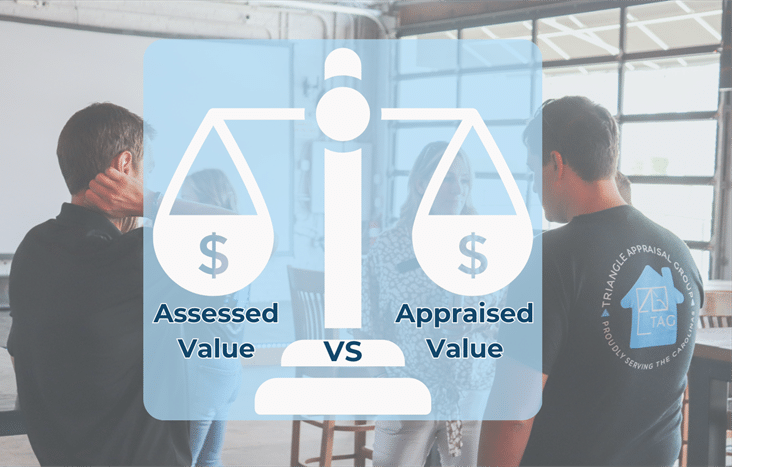Assessed Value vs. Appraised Value Decoded

Understanding real estate can be tricky, especially when comparing “assessed value” and “appraised value”. Here at Triangle Appraisal Group (TAG), we’ve seen our fair share of puzzled faces when these topics come up.
We’ll walk you through this maze with some insider info and a few stories from our own experiences.
Insights into Appraisal and Assessment Values
First off, let’s set the stage by clarifying what we’re talking about. When we say appraised value, we’re diving into the world of market value.
This is what your property could sell for under current market conditions. It’s all about what a buyer is willing to pay and what a seller is willing to accept.
On the flip side, assessed value is a bit more bureaucratic. It’s the value your local government assigns to your property for the sake of property taxes. Not quite as thrilling, but oh, so important when that tax bill arrives.

The Dual Narrative of Assessed and Appraised Values
Imagine you’re sitting on your porch in North Carolina, looking out over your land, and wondering, “What’s all this worth?” Well, it depends on who you ask.
A certified home appraiser looks at location, condition, and market trends to determine the value of a property. Your county assessor determines the value of your property using formulas, land records, and sometimes your neighbor’s sale price.
It’s important to note that assessments are typically determined by a mass appraisal. This means that your county assessor will look at a group of similar properties in the same area, and use the county’s regulated formulas and guidelines to get a general figure for homes in the area.
Here’s a little story from TAG’s vault: We once had a client, let’s call her Jane. Jane was surprised to find out that her estimate of the property’s worth was much lower than our appraisal. She was both delighted (lower taxes!) and perplexed (isn’t my house worth more?).
This brings us to a common question: “which is higher, assessed value or appraisal?” Generally, the appraised value tends to be higher, but not always.
Exploring the Depth of Land Assessment
Land assessment plays a crucial role in the assessed value. It’s not just about the size but also the use and potential of the land. Whether you’re cultivating sweet potatoes or planning a new subdivision, the N.C. land under your feet is a key part of your property’s value.
Understanding the nuances of land assessment can be a game- changer for property owners. It influences not just the assessed value for tax purposes, but can also affect decisions about land use, development, and conservation. For those looking to purchase or sell land in North Carolina, having a detailed assessment of property—including the land itself—can provide critical insights into its true value and potential.
For those interested in deeper insights into how land assessment impacts property values and tax implications in North Carolina, the North Carolina Department of Revenue offers a comprehensive guide. This resource is invaluable for property owners looking to understand the assessment process and its effect on property taxation.
Understanding the Nitty-Gritty of Appraisal vs Assessment
The difference between appraisal and assessment boils down to purpose and process. Appraisals are about market value, while assessments are about tax value. Remember Jane? She used her higher home value to get a better refinancing deal and pay less in property taxes. But let’s dive a bit deeper into this:
Appraisals, conducted by licensed professionals, are typically required by lenders when you’re looking to buy a home or refinance your mortgage. These experts use a variety of methods, including comparing your property to similar ones recently sold in the area, to determine your home’s market value. This process not only factors in the physical state of your property but also considers market trends, making it a dynamic reflection of what your home is worth at any given time.
Assessments, on the other hand, have a rhythm dictated by local government schedules, which can vary widely. Some areas reassess annually, while others may do so less frequently. The methodology can also differ, but the goal is always to establish a value for tax purposes. Unlike appraisals, assessments aren’t as closely tied to the ebb and flow of the real estate market, which can lead to significant discrepancies between the assessed value and what you might expect to sell your home for.
This difference can have real-world implications for homeowners like Jane. By understanding both her home’s appraised and assessed values, Jane could strategically plan her refinancing to capitalize on the appraised value’s reflection of the current market, potentially lowering her mortgage payments. At the same time, a lower assessed value meant her property taxes didn’t spike with her home’s market value, keeping her annual expenses more manageable.
The Ongoing Debate Over Tax
Assessed Value and Appraisal
The debate between tax assessed value vs. appraisal often centers on their impact on your wallet. A higher appraised value boosts your equity and borrowing power. A lower assessed value keeps your tax bill in check. It’s a balancing act that homeowners should be keenly aware of.
Making Sense of Your Property's Value
When considering a real estate transaction, whether you’re buying or selling, understanding both the appraised and assessed values of a property is key. The appraised value can significantly influence the negotiation process, offering a benchmark for both parties to base their expectations on. Sellers can justify their asking price, while buyers can use it to negotiate a fair deal.
On the other hand, the assessed value offers insight into future property tax obligations, affecting the overall affordability of the property. Buyers, in particular, should pay attention to this figure, as it impacts the long-term cost of owning a home. Bottom line, knowing the difference between appraised and assessed value is like having a map for navigating homeownership challenges.
At TAG, we’ve navigated these waters many times, and we’re here to help you do the same. Remember, knowledge is power, especially when it comes to your property. So, next time you’re pondering over your home’s value, just remember the tales and tips from your friends at Triangle Appraisal Group- TAG us in!
Read More:
FAQs
Assessed value can sometimes be close to market value, but often, they are different. Assessors aim to determine the value for tax purposes based on mass appraisal techniques and often update this less frequently than market conditions change. Therefore, while assessed values can provide a rough estimate, they typically do not reflect the current market value, which is influenced by recent sales and demand dynamics in real-time.
Assessed values are determined by local government assessors or a tax assessor’s office. These professionals evaluate properties within their jurisdiction to assign an assessed value that serves as the basis for property taxes. They use standardized methods and often assess properties every few years or annually, depending on local regulations.
The assessed value to market value ratio, often called the assessment ratio, is the percentage of the market value that represents the assessed value. This ratio can vary by location, type of property, and policy of the local tax assessor’s office. For example, some areas may set the assessed value at 70% of the market value, while others might use a different percentage, reflecting local tax laws and assessment practices.
Market value is determined by what a buyer is willing to pay for a property in a competitive and open market, considering the property’s characteristics and the current economic conditions. Factors influencing market value include the property’s location, size, condition, improvements, and the prices of comparable properties recently sold in the area. Market value is dynamic and changes more frequently than assessed values due to real-time market forces



